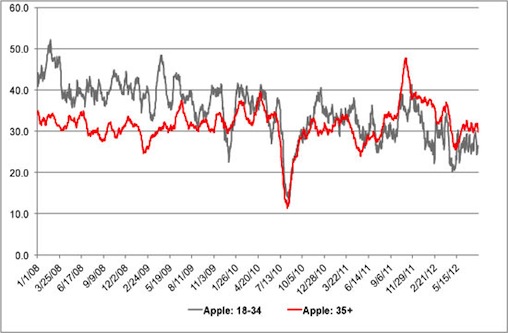Older customers are now Apple's biggest fans, said a brand perception measurement company Friday, citing shifting demographics that indicate the company's appeal to the young and technology-enamored has been slipping.
The finding from U.K.-based YouGov also puts into context recent television ads that were loudly panned, with some critics calling them "rotten" and "gagging."
Apple ran the ads, which featured a Genius -- the name for the company's in-store technical support staff -- helping customers in high-pressure situations. The 30-second spots touted the Mac and appeared during the early days of NBC's broadcast of the 2012 Olympics. They were discontinued, reportedly as planned -- within several days.
In all three ads, the Genius was played by a 24-year-old comedian named Josh Rabinowitz.
The reaction among the Apple faithful was devastating.
"I honestly can't remember a single Apple campaign that's been received so poorly," said Ken Segall, whose LinkedIn profile says he worked as the creative director for ad firm Chiat/Day and on that firm's 1997-2002 "Think Different" campaign for Apple.
"These ads are causing a widespread gagging response, and deservedly so. This thing is so upsetting, it has me talking to myself," said Segall in a post to his personal blog last week.
But the ads may not have been the failure Segall and others assumed, said YouGov today.
According to the company's BrandIndex, since mid-July 2011, Apple's biggest supporters are consumers 35 years and older. Meanwhile, the younger age group of 18 to 34 -- once the demographic most smitten with Apple -- has trended downward since then.
"Now that adults 35+ have a higher perception of Apple, it may make sense that the 'Genius' ads were airing during the Olympics, where the prime time audience is easily over 35 years old," said YouGov in a blog post. "It appears that the 35+ demographic, which includes [Baby] Boomers 50 and over, may need more product hand-holding than the younger group -- hence the Genius [ads]."

The large dip in Apple's BrandIndex Buzz score in the summer of 2010 was the impact of 'Antennagate," the brouhaha over the iPhone 4's phone call reception. (Image: YouGov's BrandIndex.)
YouGov measured consumer perception of Apple using its BrandIndex Buzz score, which asks U.S. adults whether they've heard anything about the brand, and if they have, whether it was positive or negative.
Scores can range from 100 to -100, and are the result of subtracting negative feedback from positive, meaning that a score of zero is equal parts positive and negative.
Before July 2011, scores for the 18-to-34 age group led that of 35 and older. But by November 2011, the older group's score had shot to a record 48, while the younger group's number was 13 points lower at 35.
As of today, the 35+ group's score was 31, or 15% higher then the 18-to-34 age group's score of 27.
"Apple's scores are still very positive," said Ted Marzilli, the global managing director for BrandIndex, in an interview. "It's not passe among younger consumers, but scores for that age group have been declining."
Apple's BrandIndex numbers are significantly higher than the average of the 1,100 brands that Marzilli's team tracks on a daily basis: The median Buzz score is just 4 among 18- to 34-year olds (versus Apple's 27) and only 5 for the 35-and-older group (compared to Apple's score of 31).
"It's only natural," Marzilli said when asked to explain the downward trend of Apple's score since January 2008 among younger consumers. "The iPhone and iPad have more competitors now. Those rivals are vying for the same audience, so I can see early adopters exploring other possibilities. Some of them may find a new home with a Samsung or Kindle."
The rising scores expressed by older consumers point to Apple as a mainstream brand, Marzilli argued. "There's nothing wrong with that, in fact it has obvious advantages," said Marzilli. "Microsoft has been mainstream for 30 years. The key is to be both mainstream and still perceived as cool and innovative, that's the ideal."
Marzilli declined to speculate whether Apple knew that its customers were aging, or at least that older consumers thought more of the brand than did younger ones, when it planned the oft-knocked ads.
"I don't know if I'm making Apple look smarter than they are," said Marzilli of the conclusions reached by BrandIndex.
The three Apple ads starring its Genius can be viewed on the company's website.





